|
|
|
Sort Order |
|
|
|
Items / Page
|
|
|
|
|
|
|
| Srl | Item |
| 1 |
ID:
097924
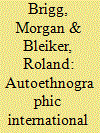

|
|
|
|
|
| Publication |
2010.
|
| Summary/Abstract |
Research is all about a person's engagement with an issue. But most approaches to International Relations actively discourage personal involvement by the researcher. We question the adequacy of this norm and the related scholarly conventions. Instead, we explore how the personal experience of the researcher can be used as a legitimate and potentially important source of insight into politics. But we also note that simply telling the story of the researcher is inadequate. We engage the ensuing dilemmas by discussing how to both appreciate and evaluate autoethnographic insights. Rather than relying on pre-determined criteria, we argue that methodological uses of the self should be judged within knowledge communities and according to their ability to open up new perspectives on political dilemmas. We then advance two related suggestions: one advocates conceptualising research around puzzles; the other explores the methodological implications of recognising that producing knowledge is an inherently relational activity.
|
|
|
|
|
|
|
|
|
|
|
|
|
|
|
|
| 2 |
ID:
159963
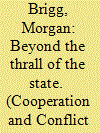

|
|
|
|
|
| Summary/Abstract |
Although the idea of the state pervades the scholarship and practice of international interventions, developing adequate knowledge of intervention contexts such as Solomon Islands requires decentring dominant perceptions about possible sources of socio-political order. In response, this article demonstrates the value of ‘relationality’ and ‘affect’ for analysing the diverse ways in which governance arises as an effect of social practice, without assuming that the state is unimportant or romanticizing statelessness. Giving conceptual priority to relations over entities while considering hitherto neglected affective forms of human interaction enables the identification of diverse micro-political forms of socio-political order and peace governance effects. An autoethnographic examination of relational-affective peace governance in post-conflict Solomon Islands shows that circulations of affect, feeling and emotion attach more strongly to customary and church institutions than they do to the state or to international interveners. This demonstrates the need to engage with unexpected sources of governance while the requirement to analyse findings within a broader historical frame signals the need to also engage with the state. A relational-affective approach, which has the potential for wider application, thus provides a way of analysing and engaging with diverse forms of political order in international interventions beyond the predilections of Northern scholarship.
|
|
|
|
|
|
|
|
|
|
|
|
|
|
|
|
| 3 |
ID:
092921
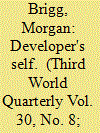

|
|
|
|
|
| Publication |
2009.
|
| Summary/Abstract |
Recent development studies literature has begun to consider the developer's self. This welcome enlargement of the field deserves to be deepened and extended by moving beyond opposition to post-development critics, and by articulating an explicit theoretical frame for examining developers' selves. By exploring Foucault's suggestion that modern approaches to knowledge and selfhood may be entwined through developmentalism, this paper proposes a flexible and non-deterministic cultural-historical framework for considering developers' selves. Foucault's analyses of relations of power and subjectivity provide strategies for examining developers' selves, but this does not suggest that such selves can be read off the proposed framework. Examining developers' selves is necessarily a reflective ethical task, and one which requires engaging the external relations that constitute the self. Foucault provides valuable resources for this task, but there is also a need to extend upon and complement a Foucauldian approach. Pursuing our new-found interest in developers' selves by working through and beyond Foucault promises to open new professional futures and possibilities for development practice.
|
|
|
|
|
|
|
|
|
|
|
|
|
|
|
|
| 4 |
ID:
145527
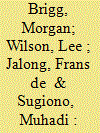

|
|
|
|
|
| Summary/Abstract |
Indonesia's normative leadership at the 1955 Asian-African Conference was grounded in anti-colonialism that became part of the ‘Bandung spirit’. However, the shape of Indonesia's recent leadership, following its remarkable democratisation, is harder to fathom. In response, this article suggests that Indonesia's regional and international engagements can be usefully understood through the lens of shifting domestic efforts to navigate unity with diversity, including as this is reflected in long-standing foreign policy commitments. Empirical reference points include the management of conflict in the Indonesian democratic transition, the place of civilian militias in Indonesian political life, and the Bali Democracy Forum. The case is made that Indonesia exhibits a remarkable embrace of diversity alongside substantial illiberality—a pattern that generates a flexible form of liberalism which presents difficulties, but also suggests particular opportunities for Indonesian leadership. Considering Indonesian navigation of unity with diversity enables a better understanding of the current and potential future shape of Indonesian leadership than analyses that rely on macro-level expectations of democratisation drawn from dominant liberal understandings of democracy and political order. This is in part because of the continuing salience of commitments to diversity, independence and cooperation that were articulated at Bandung in 1955.
|
|
|
|
|
|
|
|
|
|
|
|
|
|
|
|
| 5 |
ID:
175358


|
|
|
|
|
| Summary/Abstract |
This introduction provides an overview for the following collection of articles that engage with, and aim to extend, recent scholarship emphasising space as a category of analysis in peace and conflict studies. Attempts to ‘spatialise’ this field of enquiry have emphasised the ways actors and ideas travel and transform across scale (from the personal to the local, regional and global) and how agents, actors and identities constitute, and are constituted by, space and place in dynamics of conflict and peace. Attention to space has increased appreciation of the complex nature of nature of war- and peace-‘scapes’, and reflects upon space as material and symbolic, given meaning through peoples’ embodied activity and interactions. The articles in this issue engage with the foundations of the spatial turn and build upon innovations in spatial analysis of peace and conflict by focussing on the idea of ‘emplacement’ and emplaced security as critical to peacebuilding efforts and processes of conflict transition. To do so, we consider place in a relational sense, focussing on attachment, affective connection and narratives of place-identity as these are connected with conflict management, security, governance and political ordering.
|
|
|
|
|
|
|
|
|
|
|
|
|
|
|
|
| 6 |
ID:
158642
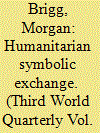

|
|
|
|
|
| Summary/Abstract |
Moral common sense frames the relationship between privileged and at-risk populations underpinning contemporary Responsibility to Protect (R2P) discourse. This article develops an alternative by considering the relationship between archetypes of would-be rescuers and victims through Jean Baudrillard’s theorisation of symbolic exchange. Baudrillardian analysis connects personal morality and affective intersubjective symbolic exchange with the politics of international order. This leads, first, to an argument that current foundations for advocating R2P risk participating in a problematic moral economy of symbolic exchange between would-be rescuers and victims. Nonetheless, and secondly, the article deploys symbolic exchange to develop suggestions for partially re-figuring R2P’s humanitarian impulse by engaging ‘locally’ – both through one’s self (in the ethical relation suggested by Emmanuel Levinas) and with diverse forms of political order (following Jacques Rancière’s conception of politics). Doing so supports moves to engage a wide array of individual actors in a more interactive and less hierarchical form of R2P, to drive deeper consideration of local complexities of R2P through engagement with diverse local forms of political order, and to develop a more inclusive understanding of ‘humanity’ in order to bolster R2P’s normative foundations.
|
|
|
|
|
|
|
|
|
|
|
|
|
|
|
|
| 7 |
ID:
108708
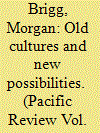

|
|
|
|
|
| Publication |
2011.
|
| Summary/Abstract |
Prevailing approaches to managing international relations are heavily influenced by the European legacy and associated understandings of diplomacy and order. To explore possibilities for expanding beyond these approaches, this paper examines an exchange that is particularly curious and provocative from an Australian vantage: the longstanding seafaring connection between Australian Aboriginal people of northeast Arnhem Land and people of what is present-day Eastern Indonesia. First, the paper makes an argument for moving beyond the developmentalist view that modern diplomacy and conflict management arise with the expansion of European influence. It then introduces a conceptual frame which opens to other ways of approaching political life and relations across difference by thinking in terms of three distinct yet overlapping forms of socio-political order - the traditional-mythical, the prophetic-religious and the modern-bureaucratic. Turning to the Aboriginal-Indonesian connection, I provide an overview of the relationship and academic approaches to it before examining a number of puzzles surrounding how we might know this relationship. Grappling with these puzzles shows that the Marege'-Makassar connection mobilises a flexible and 'relational' approach to socio-political order in contrast with the exclusionary sovereign logic of the modern nation-state. Experimenting with relationality promises to broaden and deepen our contemporary approach to diplomacy and international relations in the region and beyond.
|
|
|
|
|
|
|
|
|
|
|
|
|
|
|
|
| 8 |
ID:
187535
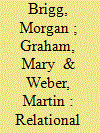

|
|
|
|
|
| Summary/Abstract |
Ontological parochialism persists in International Relations (IR) scholarship among gestures towards relational ontological reinvention. Meanwhile, the inter-polity relations of many Indigenous peoples pre-date contemporary IR and tend to be substantively relational. This situation invites rethinking of IR's understandings of political order and inter-polity relations. We take up this task by laying out necessary methodological innovations to engage with Aboriginal Australia and then showing how conventional and much recent heterodox IR seek to create forms of ‘escape’ from lived political relations by asserting the powerful yet problematic social science mechanism of observer's distance. This demonstrates a need to take Aboriginal Australia as a system on its own terms to speak back to IR. We next explain how Aboriginal Australian people produce political order on the Australian continent through a ‘relational-ecological’ disposition that contrasts with IR's predominant ‘survivalist’ disposition. The accompanying capacity to manage survivalism through relationalism provides an avenue for engaging with and recasting some of mainstream IR's survivalist assumptions, including by considering an Aboriginal approach to multipolarity, without attempting ‘pure escape’ through alternative ontologies. We thus argue that while it is necessary to critique and recast dominant IR, doing so requires putting dominant IR and Indigenous understandings into relational exchange.
|
|
|
|
|
|
|
|
|
|
|
|
|
|
|
|
| 9 |
ID:
175365
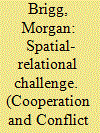

|
|
|
|
|
| Summary/Abstract |
The nascent spatial turn in peace and conflict studies is a promising development that expands conceptual resources and offers useful correctives to existing scholarship. However, the turn to space and place tends not to adequately emplace itself (including on its own European-derived terms) or sufficiently engage the socio-spatial difference of diverse peoples. Instead, a de-contextualised knower is invited to apply a new set of mobile scholarly tools in various settings without seriously considering diverse peoples’ conceptualisation and operationalisation of place in socio-political ordering. Long-standing Aboriginal Australian approaches to place, meanwhile, indicate the diversity and sophistication of approaches to space and place. They furthermore show that western political ontology – including the figures of the individual and the state embedded in much dominant scholarship – may not be relevant in many settings in which peace and conflict scholarship is undertaken. Realising the full potential of the spatial turn requires grappling with the relational emplacement of the knowing subject and the varied ways in which place configures socio-political order both for diverse peoples ‘in the field’ and in the centres of dominant forms of knowing in the Global North.
|
|
|
|
|
|
|
|
|
|
|
|
|
|
|
|
|
|
|
|
|